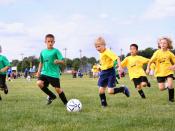Johnson and Johnson (1989) are the developers of the cooperative learning method. There has been a long history of research on cooperative, competitive, and individualistic efforts. Since the first research study in 1898, nearly 600 experimental studies and over 100 co-relational studies have been conducted. The multiple outcomes studied can be classified into three major categories: achievement/productivity, positive relationships, and psychological health. Research done by Cooper (1990) supports what has been done by developers of the method under study. That research indicates that cooperation, compared with competitive and individualistic efforts, typically result in (a) higher achievement and greater productivity, (b) more caring, supportive, and committed relationships, and (c) greater psychological health, social competence, and self-esteem. The positive effects that cooperation has on so many important outcomes makes cooperative learning one of the most valuable tools educators have.
Vygotsky (1994) agrees that collaboration promotes cognitive growth because students' model from each other more advanced ways of thinking than any would demonstrate individually.
This is in accordance with cognitive response from research done by Piaget (1978), that collaboration among peers hastens the decline of egocentrism and allows the development of more advanced ways of understanding and dealing with the world.
In addition to achievement outcomes, researchers, as indicated in the review of literature, have also assessed the impact of cooperative learning on problem-solving. Given the complex nature of problem-solving and the multiple resources that a cooperative learning group has at its disposal, one would logically expect cooperative learning to have a positive effect on this outcome as well. This hypothesis is confirmed by Zhining, Quinn, Johnson, and Johnson (1995) who conclude that students of all age levels (elementary, secondary, college, and adult) who work cooperatively outscore students who work competitively. They claim that the average student in a cooperative learning group solved...


